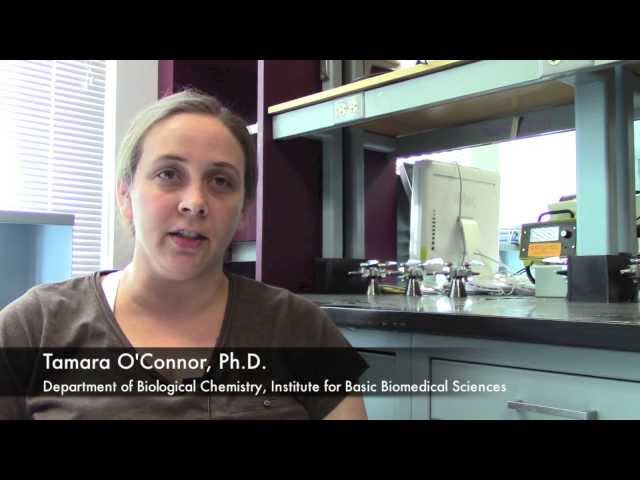Research Summary
Dr. O’Connor is researching the molecular dissection of host-pathogen interactions and the evolution of virulence strategies in natural reservoirs.
The outcome of most parasitic relationships is decided by an elaborate series of events involving hundreds of proteins. Understanding this interaction requires the analysis of the molecular mechanisms operating in both organisms and the causal relationships acting at the interface between them. The O’Connor lab studies the molecular basis of infectious disease using Legionella pneumophila pathogenesis as a model system.
L. pneumophila is a bacterial pathogen. In its natural environment of fresh water and soil, L. pneumophila is a parasite of a diverse array of amoebae and ciliated protozoa. When contaminated water aerosols are inhaled by humans, L. pneumophila replicates in alveolar macrophages causing an often fatal form of pneumonia called Legionnaires’ disease. We examine how L. pneumophila is able to manipulate host cell processes to establish growth within its host and the impact of its interaction with protozoa on the evolution of these virulence mechanisms.
Many bacterial pathogens use sophisticated secretion systems to translocate bacterial proteins into the cytoplasm of their host cell. These proteins modulate a vast array of host cellular processes to promote bacterial survival and replication. Defining the molecular mechanisms by which these proteins contribute to virulence is essential in understanding how bacterial pathogens cause disease. L. pneumophila harbors one of the largest repertoires of translocated substrates identified to date, deploying an arsenal of 270 proteins to modulate host cell possesses. Maintaining this large repertoire has resulted in a high degree of redundancy whereby different proteins can manipulate complementary host cell pathways providing the bacterium with multiple strategies to accomplish a single task. We use L. pneumophila pathogenesis to examine the numerous mechanisms by which an intracellular bacterial pathogen can establish infection, how it exploits host cell machinery to accomplish this and how individual proteins and their component pathways coordinately contribute to disease.
Although the role of protozoa in the lifecycle of many bacterial pathogens is only beginning to be appreciated, it is emerging as an important aspect in the epidemiology of many water and soil-borne pathogens. Not only do protozoa function as natural reservoirs for many pathogenic microorganisms, their interaction both provides a rich environment for the evolution of novel virulence strategies and enhances invasiveness in mammalian hosts. The genetic and molecular characterization of this interaction is instrumental in understanding how bacterial pathogens persist in nature and the selective pressures that shape the evolution of virulence strategies that promote disease in humans.
The ability of L. pneumophila to grow in a diverse array of protozoan hosts allows us to examine the molecular determinants of host-range and the evolution of microbial pathogenesis in nature. In fresh water and soil, L. pneumophila is destined to encounter a large number of amoebal species. This necessitates a virulence strategy that can compensate for host variation and thus, the accumulation of host-specific virulence factors. Using genetics and functional genomics, we compare and contrast the repertoires of virulence proteins required for growth in a broad assortment of hosts, how the network of molecular interactions differs between hosts and the mechanisms by which L. pneumophila copes with this variation. By examining how virulence strategies acquired for growth in amoebae can be used in mammalian hosts, we are defining how this interaction promotes the transition of bacterial pathogens from their environmental reservoirs to humans, bridging the gap between the ecology of microbial pathogens and disease.
Selected Publications
View all on PubMed
Park JM, Ghosh S, O’Connor TJ (2020) Combinatorial selection in environmental hosts drives the evolution of a human pathogen. Nat Microbiol. 5:599
Boamah DK, Zhou G, Ensminger AW, O’Connor TJ (2017) From many hosts, one accidental pathogen: the diverse protozoan hosts of Legionella. Front Cell Infect Microbiol. 7:477
Ghosh S and O’Connor TJ (2017) Beyond paralogs: the multiple layers of redundancy in bacterial pathogenesis. Front Cell Infect Microbiol. 7:467
O’Connor TJ, Zheng H, VanRheenen SM, Ghosh S, Cianciotto NP, Isberg RR (2016) Iron triggers early egress by the intracellular bacterial pathogen Legionella pneumophila. Infect Immun. 84:2185-2197
O’Connor TJ, Boyd D, Dorer M, Isberg RR (2012) Aggravating genetic interactions allow a solution to redundancy in a bacterial pathogen. Science 338:1440-1444



Patient Ratings & Comments
The Patient Rating score is an average of all responses to physician related questions on the national CG-CAHPS Medical Practice patient experience survey through Press Ganey. Responses are measured on a scale of 1 to 5, with 5 being the best score. Comments are also gathered from our CG-CAHPS Medical Practice Survey through Press Ganey and displayed in their entirety. Patients are de-identified for confidentiality and patient privacy.